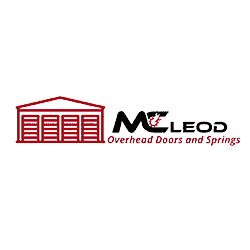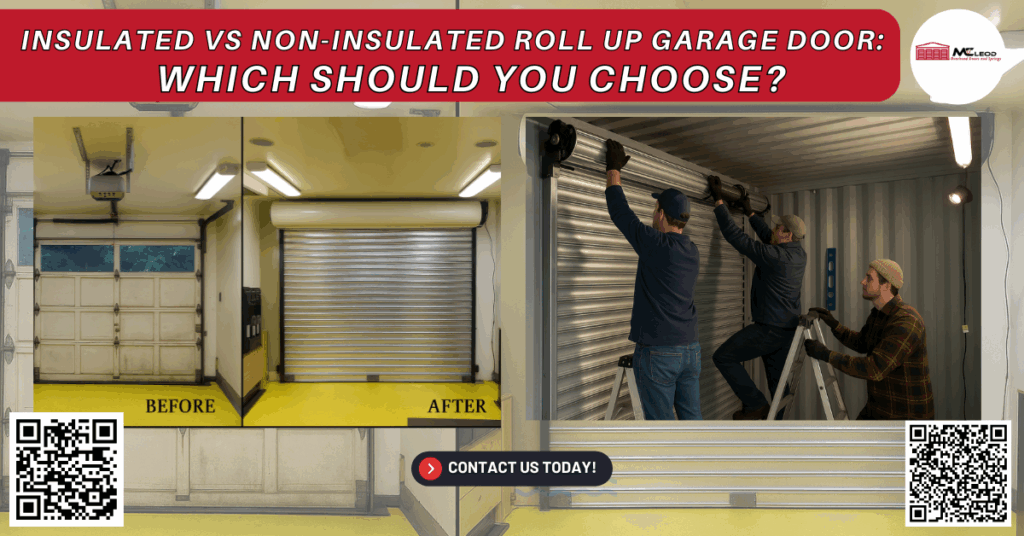When the Johnson family decided to renovate their 3,000-square-foot auto body shop near downtown Baytown, they knew they needed a reliable, space-saving solution for their garage access points. After weeks of researching different garage door models, they contacted us at McLeod Overhead Doors and Springs for a full site check. Their biggest dilemma? Whether to choose a manual or automatic roll-up garage door system that meets residential and light commercial standards while staying within budget.
With Texas prone to heavy winds and hurricanes, durability and certified wind load ratings were a key concern, especially for buildings located near coastal zones. Interestingly, data from building product distributors show that roll-up garage doors account for over 65% of new commercial garage installations in areas with limited interior space, thanks to their vertical roll operation, compact slat door design, and long-term maintenance advantages.
As one of Baytown’s most trusted providers of garage door installation and repair, our team at McLeod Overhead Doors and Springs helps homeowners, contractors, and businesses make informed choices. Let’s break down the key differences between manual and automatic roll-up doors, their applications, door models, and how to choose the right option for your building type, use case, and budget.
What Is a Roll-Up Garage Door?
A roll-up garage door, also known as a rolling sheet door or slat door, is a type of door constructed from narrow horizontal steel or aluminum panels that roll into a coil above the door opening. Instead of swinging out or sliding along tracks like sectional doors, roll-up doors utilize a compact overhead roll, making them ideal for field applications with limited ceiling clearance or overhead obstructions.
This door model is commonly used in commercial, industrial, and residential settings, especially in sheds, auto shops, storage facilities, and retail sites. Many products are now available with insulation, color options, galvanized steel sheets, and heavy-duty chain hoist mechanisms.
Roll-up garage doors are offered in light-duty, medium-duty, and heavy-duty series, each designed to meet specific building codes, load requirements, and operational standards. Brands like Janus and Amarr offer model-specific features, such as cam action devices, quick installation brackets, and durable polyester paint finishes that resist rust and weather damage.
Manual Roll-Up Garage Doors
Features and Benefits
Manual roll-up garage doors are a simple, budget-friendly solution ideal for light-duty applications like garden sheds, workshops, or rarely accessed storage spaces. These doors can be operated by hand or using a chain hoist, offering reliable access without the need for power.
Available door models include basic steel or aluminum slat doors, often treated with powder-coated finishes or galvanized for corrosion resistance. Doors are mounted on side guides and can be custom-sized from single door widths to extra-wide formats exceeding 16 feet.
Key features include:
- No electricity required – making it suitable for remote sites or areas without permanent utilities.
- Lower upfront cost – materials, labor rates, and parts are generally less expensive.
- Easy maintenance – no motors, sensors, or electrical wiring to service.
- Installation time is usually shorter, often completed in one day, depending on the garage site.
- Certified wind load options are available for select models in hurricane-prone zones like Baytown.
Limitations
However, manual doors may not be the best fit for everyone. Frequent operation can become tiring, especially for larger steel doors or commercial roll applications. Manual models also lack advanced safety features like motion sensors or emergency reverse.
In high-wind areas, a Florida Building Code-approved manual roll-up door must include reinforced latching systems and wind locks to stay compliant.
Automatic Roll-Up Garage Doors
Features and Advantages
Automatic roll-up doors offer push-button convenience, enhanced security, and modern smart features that integrate with smartphone apps, remote controls, and even environmental monitoring systems.
These garage door models come with:
- Electric motors and chain hoists are designed for high-cycle operations.
- Safety features such as photo-eye sensors, auto-reverse systems, and battery backup units.
- Optional insulated panels for better temperature control, ideal for climate-controlled garages or masonry buildings.
- Smart home integration allows users to open and close doors from anywhere via Wi-Fi.
- Multiple color options, including popular finishes like tan, brown, gray, and white, to match exterior building designs.
Most automatic roll-up doors meet or exceed international building codes, including certified wind load ratings and UL 325 safety standards. Depending on the series, you’ll find enhanced sheet durability, weather-resistant seals, and models with integrated windows for natural light.
Drawbacks
- Higher cost – due to motors, controllers, and specialized labor during installation.
- Longer delivery times – especially for custom-sized or commercial doors with unique site requirements or special features.
- Ongoing maintenance – such as chain lubrication, sensor testing, and electrical troubleshooting.
Despite the extra pricing, most business owners in Baytown choose automatic models for speed, safety, and professional appearance, especially in locations with high foot or vehicle traffic.
Lifestyle Considerations
Choosing the right roll-up garage door depends on more than just budget. Your daily use, property type, and long-term expectations are all part of the equation.
For Homeowners
If you’re a homeowner with a detached garage, backyard shed, or small workshop, a manual roll-up door may be the economical alternative you need. With fewer components and simple chain operation, these doors work reliably for occasional access points and require minimal servicing.
However, if you frequently enter your garage, say, to park a vehicle, access tools, or manage a hobby space, an automatic roll-up garage door saves time and keeps you out of the rain or heat. Especially in Baytown’s humid summers, the ability to remotely open your garage is a big perk.
For Businesses and Industrial Sites
For commercial applications, such as retail shops, warehouses, or industrial loading docks, automatic heavy-duty roll-up garage doors are the clear winner. These are designed to meet stringent building codes, accommodate high-use cycles, and support environmental controls like insulation, airflow, or dust mitigation.
Businesses may also benefit from Janus model features, like cam-action devices that prevent slat misalignment and springless systems that reduce long-term service costs.
Durability and Weather Resistance
All roll-up garage doors installed by McLeod Overhead Doors and Springs are made from galvanized steel or aluminum, rated for high performance and extended lifespan. Rolling sheet doors with polyester finishes resist salt spray and UV degradation, important in coastal or high-sun environments.
Key specs to look for:
- Wind load certification for coastal counties like Harris County.
- Gauge thickness of panels – heavier gauges offer better durability (26-gauge and below is common).
- Rust-proof guides and bottom bars to prevent jamming.
- Options for insulated slats, brush seals, or rubber gaskets for temperature-sensitive applications.
Maintenance and Inspection Needs
Manual doors require periodic checks of:
- Chain tension and gear alignment
- Surface rust or corrosion on slats and side rails
- Proper latch function
Automatic doors require additional checks:
- Motor lubrication and belt inspection
- Photo-eye sensor alignment
- Backup battery charge and control board function
We offer scheduled maintenance plans with annual inspection reports, keeping your garage door operation smooth and up to code.
Cost Comparison and Product Options
Here’s a cost overview based on common garage door models and features:
| Feature | Manual Roll-Up Door | Automatic Roll-Up Door |
| Starting Price | $900 – $1,400 | $1,800 – $3,500+ |
| Installation Time | 1 day | 1–2 days |
| Best Use | Low traffic, sheds | High traffic, retail/garage |
| Smart Features | No | Yes (Wi-Fi/app enabled) |
| Maintenance Level | Low | Moderate |
| Insulation Options | Limited | Wide range |
| Wind Load Rated | Optional | Often Standard |
How Can McLeod Overhead Doors and Springs Help You?
Whether you’re installing a new roll-up door, replacing an old garage door model, or outfitting a commercial site with heavy-duty industrial doors, McLeod Overhead Doors and Springs is here for you.
Our Baytown-based team provides:
- Custom roll-up door installations for homes, shops, and commercial addresses.
- Quick site checks, product recommendations, and permit support.
- Access to trusted brands like Amarr and Janus with multiple color, panel, and size options.
- Wind-certified models for hurricane zones and strict code compliance.
- A wide range of manual and automatic roll-up garage door options to fit your lifestyle and budget.
📍 Visit Us: 8820 N Hwy 146, Baytown, TX 77520
📞 Call Now: (281) 603-2885
Don’t leave your garage to chance. Contact us now and choose the door that rolls up to meet your needs with McLeod Overhead Doors and Springs.
Frequently Asked Questions (FAQs)
1. Can I upgrade my manual roll-up garage door to an automatic version later?
Yes, most manual roll-up doors can be retrofitted with an automatic opener if structurally compatible.
2. What size options are available for roll-up garage doors?
Roll-up doors come in a wide range of sizes, from small 6’x7’ shed doors to commercial-grade 20’x14’ openings.
3. Are roll-up garage doors safe during hurricanes?
Yes, as long as they are wind load certified and installed according to Florida or local building codes.
4. How long does a typical roll-up garage door last?
With proper maintenance, roll-up doors can last 20–25 years, especially models made with galvanized steel and rust-resistant components.

